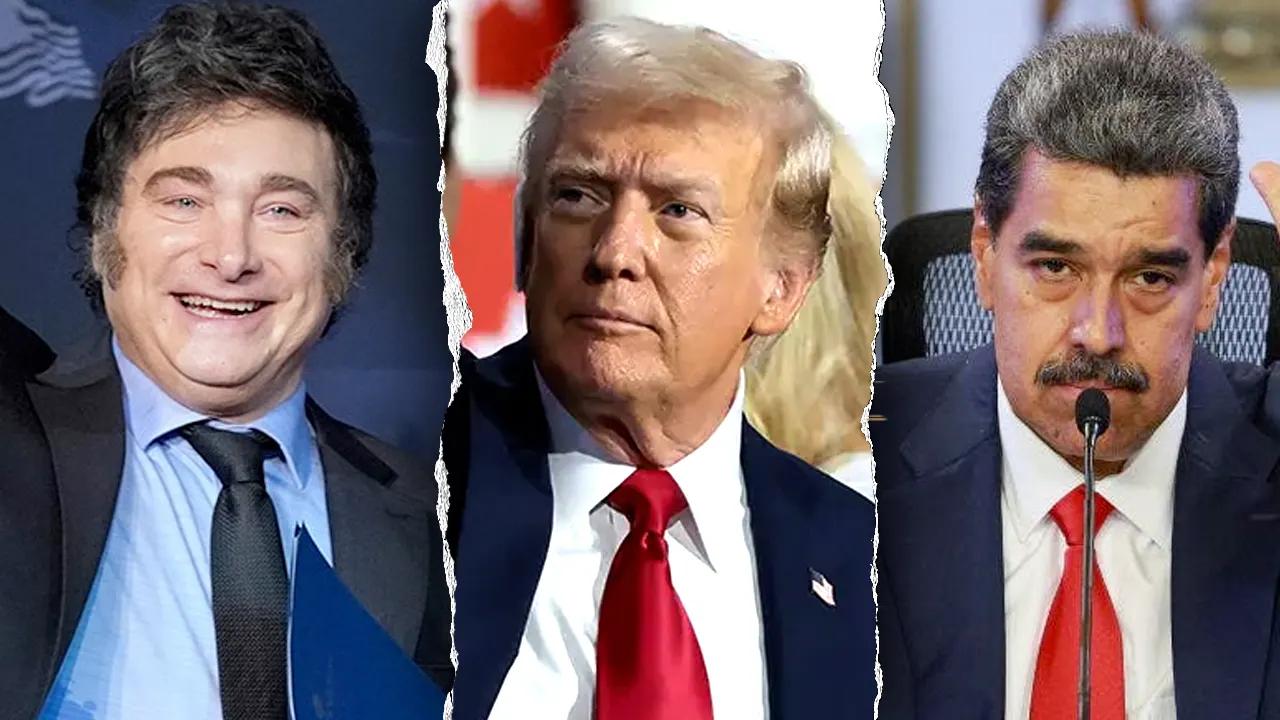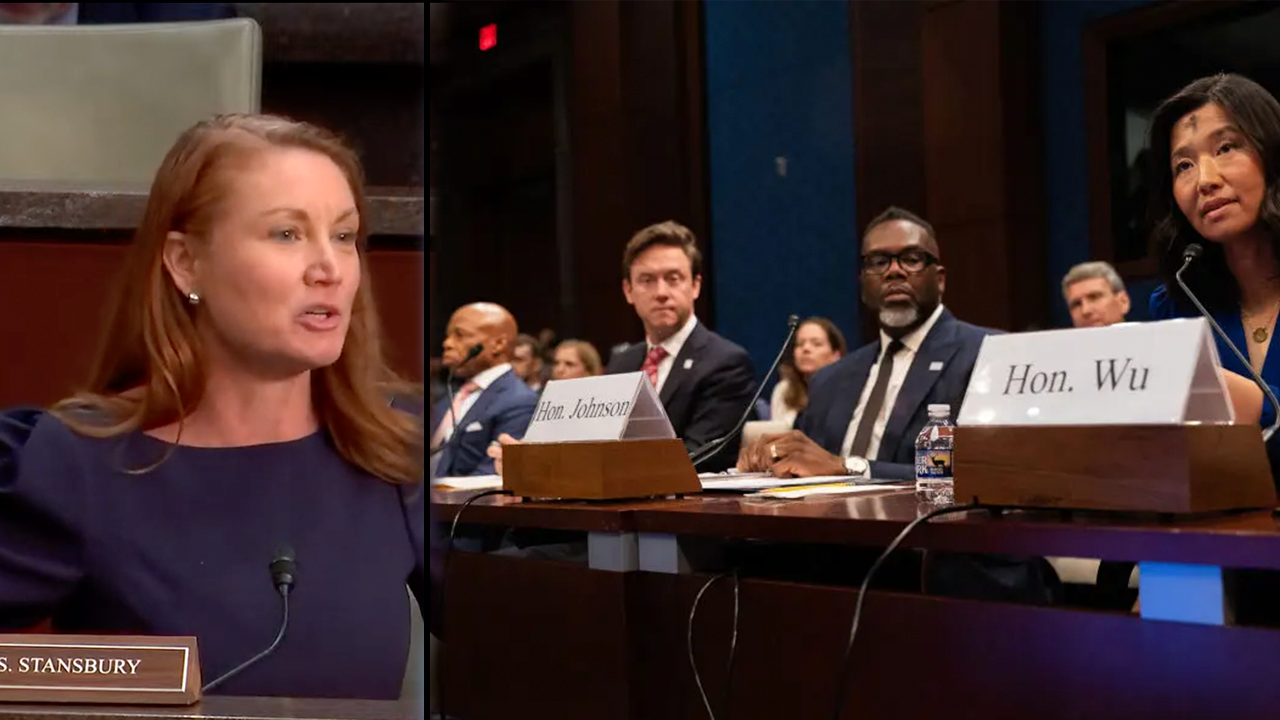MEXICO CITY – U.S. foes in Latin America have expressed apprehension regarding the forthcoming Trump administration, primarily due to anticipated shifts in U.S. foreign policy that may adversely affect their national interests.
Just last week, Trump’s tariff policies seemingly unsettled Mexico’s socialist president, who seemed to offer an olive branch to the incoming administration over tariffs and migration.
“The authoritarian axis or autocrats of the region: Cuba, Venezuela, Nicaragua and Bolivia who have an anti-American stance and whose foreign policies are closer to Russia, China and Iran will certainly think twice before they become more aggressive in the region,” Joseph Humire, Executive Director of the Center for a Secure Free Society, told Fox News Digital.
“Those countries have often provoked and destabilized their neighbors, have created platforms for criminal apparatus to grow throughout Latin America (transnational crime and international terrorism) and pushed to align the region closer to China. They will think twice about continuing to do a lot of that, because it’s not going to be as effective. They are going to respect the United States position. The United States is going to project strength so adversaries and autocratic countries know that if they try to provoke conflicts or war, there will be consequences,” he said.
MEXICAN PRESIDENT MIGHT BE CHANGING VIEW ON US AS TRUMP WIN SENDS WARNING TO RULING SOCIALISTS
FILE – President-elect Donald Trump speaks during a meeting with the House GOP conference, Nov. 13, 2024, in Washington. (Allison Robbert/Pool via AP, File)
Humire, who wrote a paper titled “The Foreign Policy Foundations of Trumpism,” noted, “A return to nation-state sovereignty and burden sharing are the most important pillars of President Trump’s foreign policy, known as America First or ‘Trumpism.’ These pillars come together to support a vision that America must be strong at home to project power abroad. In many ways, it is a return to the basics of U.S. foreign policy established by the founding fathers.”
“The reaction for President Trump’s victory in Latin America is overwhelmingly positive. I was recently in Mar-a-Lago, and Argentinian President Javier Milei was the first foreign leader to see President Trump after his victory. It was very important that a President from Latin America was one of the first presidents to see President Trump, because President Milei’s victory shortened the distance for a new way of right-wing-conservative-libertarian presidents in Latin America to rise at the surface and achieve electoral victories.”
He predicted, “We are going to start to see a new wave of a political class rising in Latin America connected to President Bolsonaro, to President Milei and hopefully many elections coming up in Colombia, Chile, Ecuador and Perú. Many of these countries are going to look for those candidates as potential front-runners for those elections. The brand of conservatives, of libertarians, of right-wing leaders is immediately growing. I think many of these leaders will be inspired to move their policies way closer to the U.S. and won’t have as many obstacles as those presented by the Biden-Harris administration.”
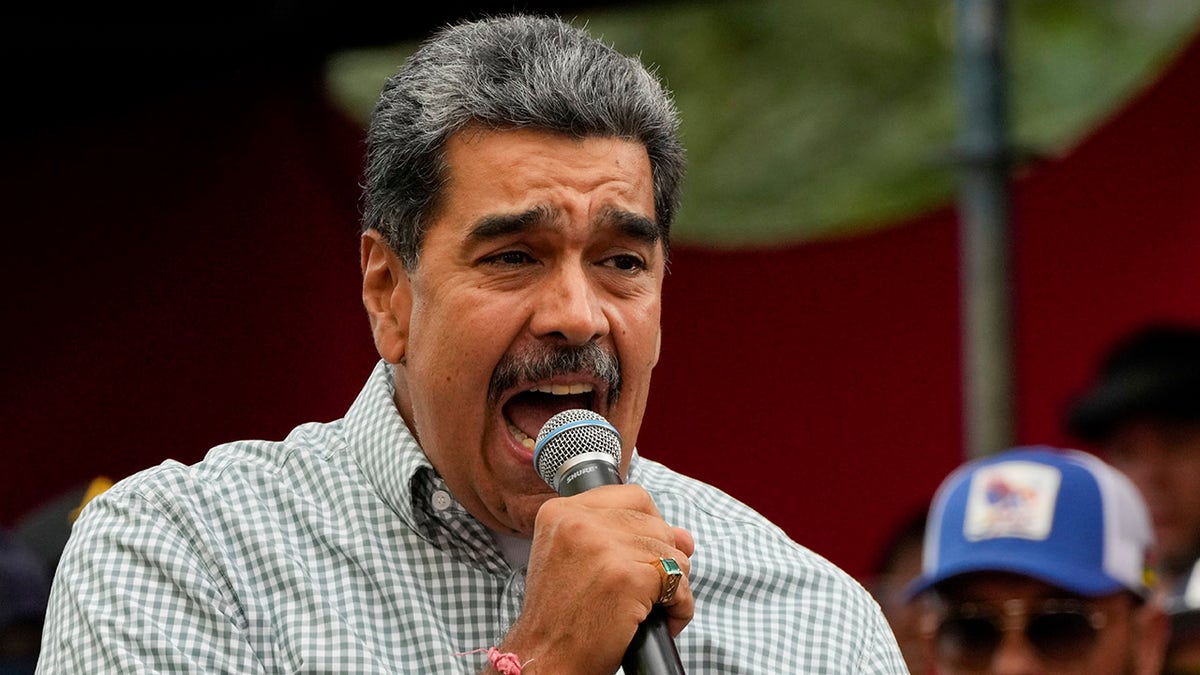
Venezuela’s President Nicolas Maduro addresses government loyalists gathered at the presidential palace in support of his reelection one month after the presidential vote, in Caracas, Venezuela, Wednesday, Aug. 28, 2024. (AP Photo/Ariana Cubillos)
Given its extensive economic ties and shared border with the United States, Mexico is particularly concerned about potential changes in immigration and trade policies. President Claudia Sheinbaum’s administration is wary of stricter immigration controls and the possibility of renegotiating trade agreements, which could impact Mexico’s economy and the well-being of its citizens.
The Colombian government is concerned about potential shifts in U.S. drug policy and security cooperation. President Gustavo Petro’s administration fears that a more aggressive U.S. approach could complicate ongoing peace processes and efforts to combat drug trafficking within the country.
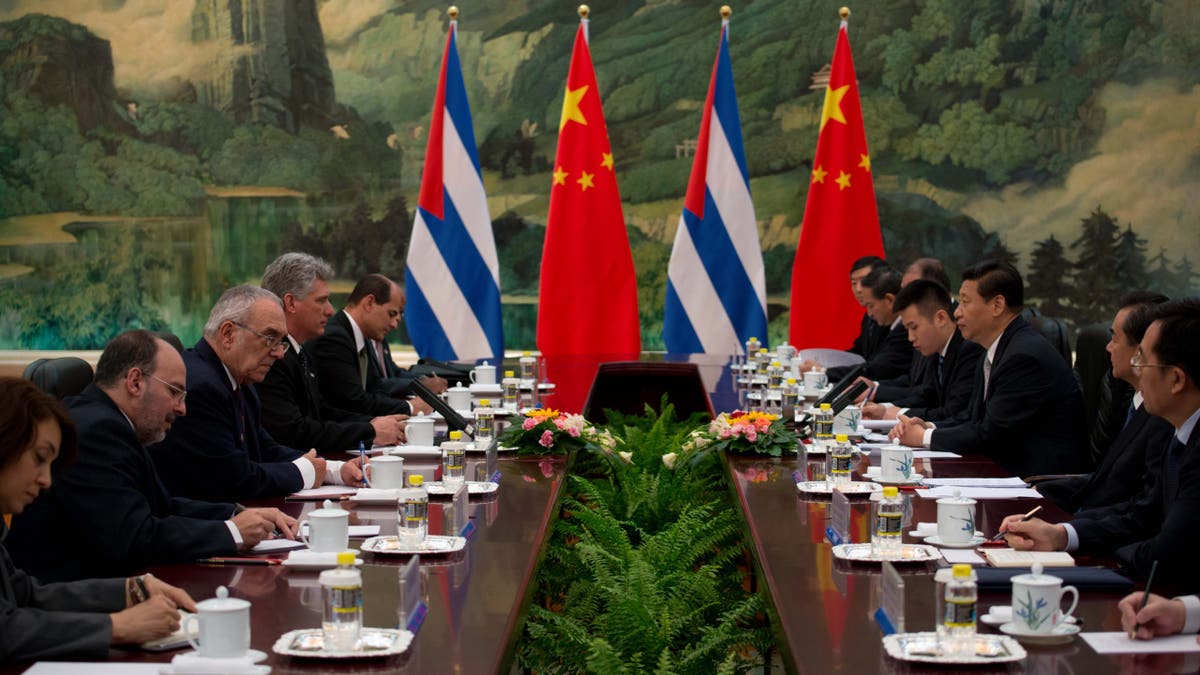
China’s President Xi Jinping (center R) attending a meeting with Cuba’s First Vice President of the Council of State Miguel Diaz-Canel (center L) at the Great Hall of the People on June 18, 2013. AFP Photo/ Pool/Ed Jones (Ed Jones/AFP via Getty Images)
Cuba, Nicaragua, and Venezuela, often referred to by U.S. officials as the “troika of tyranny,” anticipate increased sanctions and diplomatic pressure under the new administration. The appointment of Marco Rubio as Secretary of State signals a more hardline stance against these governments, potentially leading to heightened economic and political isolation.
Chilean economist Axel Kaiser, Senior Fellow at the Archbridge Institute, told Fox News Digital: “All of Latin America will benefit from Marco Rubio as Secretary of State, because he really cares about Latin America, and he is aware of the socialist threat in our region, and therefore he will take measures that will put pressure on left-wing authoritarian governments or those with left-wing authoritarian projects, such as Mexico, to stay at bay. Perhaps there is also some hope with Venezuela. I think Marco Rubio is going to do everything possible to ensure a transition to democracy in Venezuela.”
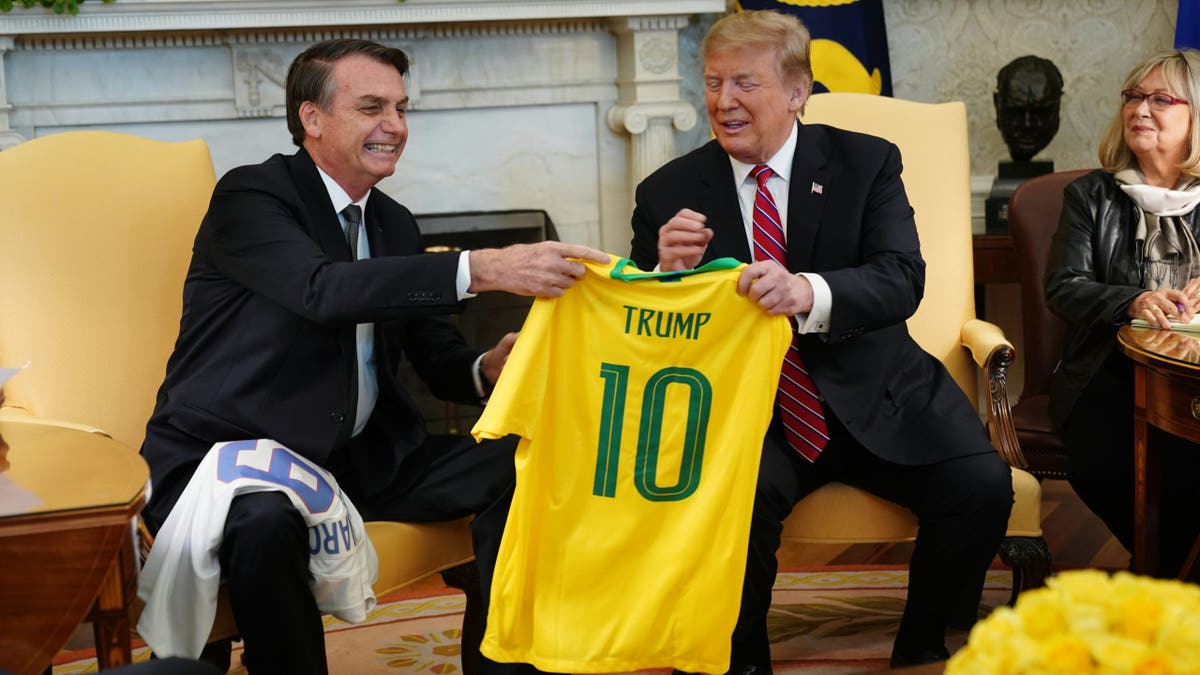
Then-President Jair Bolsonaro, of Brazil, left, gives U.S. President Donald Trump, a soccer jersey during a meeting in the Oval Office of the White House in Washington, D.C., on Tuesday, March 19, 2019. (Chris Kleponis/Pool via Bloomberg)
Kaiser continued: “There can be no better news for the entire region, whether they are countries governed by left-wing governments or right-wing governments, because the United States is going to collaborate more actively. For example, Trump’s victory is decisive for Argentina, because, in the financial needs that country is facing, the help from the United States is going to make an important difference for Javier Milei to do well, and his success is going to have an impact on the entire region.”
He continued, “In Brazil, Bolsonaro is going to experience an important recovery, he is already having one, we will see if he ends up being the presidential candidate. Trump’s victory is important for leaders like him, like José Antonio Kast and Johannes Kaiser in Chile, and Vicky Dávila in Colombia. There are several leaders who could benefit from a more conservative government in the U.S., because they will be aligned, and I believe that the United States will support them.”
TRUMP LIKELY TO MAKE SEVERAL BORDER SECURITY MOVES ON FIRST DAY, SAYS EXPERT
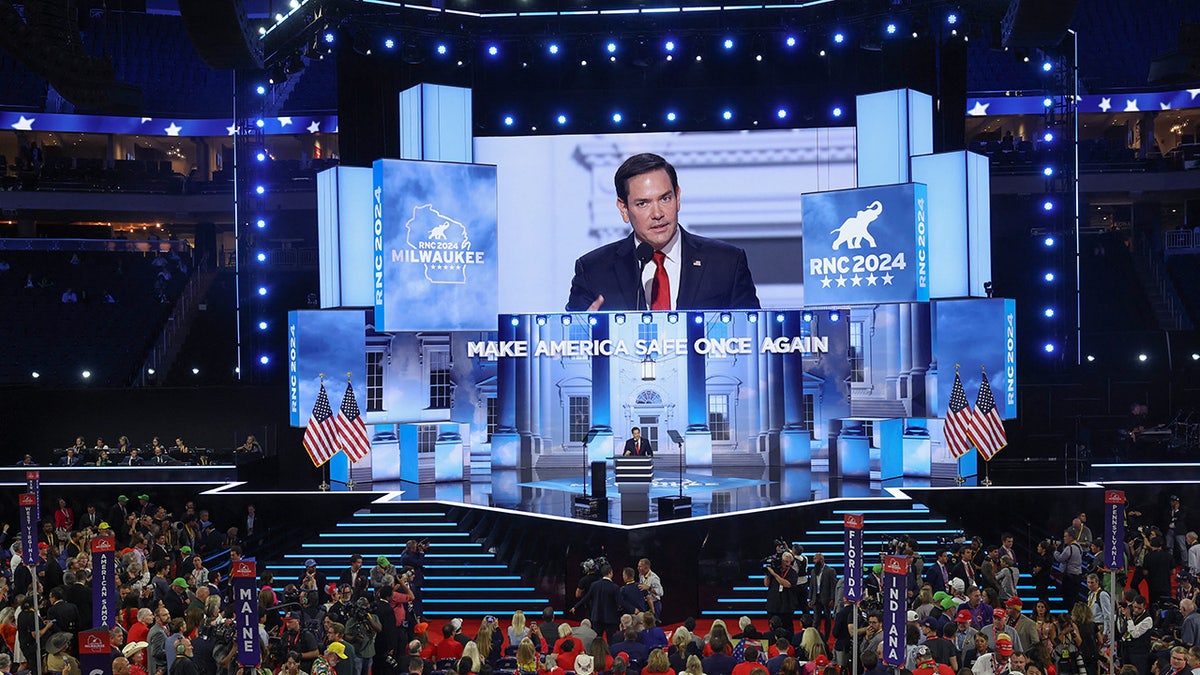
Senator Marco Rubio (R-FL) speaks on Day 2 of the Republican National Convention (RNC), at the Fiserv Forum in Milwaukee, Wisconsin, July 16, 2024. Reuters/Mike Segar.
Under President Javier Milei, who shares a libertarian and pro-market stance similar to Trump’s, Argentina anticipates strengthening bilateral relations. Milei is seeking U.S. support to secure additional International Monetary Fund (IMF) loans and attract investments, aiming to stabilize Argentina’s economy and implement capitalist reforms.
With a right-leaning government, Brazil may find common ground with the Trump administration on trade and regional security. Potential collaboration could involve increased U.S. investments and support for Brazil’s initiatives in areas like infrastructure and energy.
“Donald Trump’s victory is very important for Latin America . . . because he has a team with many people who are experts on security, democracy, freedom, and the reality of Latin America. . . . I feel that this time he will not leave any pending tasks; the authoritarian regimes of the region such as Cuba, Nicaragua, Venezuela and Bolivia will surely no longer have an ally in the United States, by action or omission,” Colombian Senator Paola Holguin told Fox News Digital.

An armored police car drives through teargas during a protest against Venezuelan President Nicolas Maduro in Caracas on July 29, 2024, a day after the Venezuelan presidential election. (Photo by Raul Arboleda/AFP via Getty Images)
Holguin, a member of the conservative-leaning Centro Democrático party continued, “Although Colombia and the United States have maintained a stable and harmonious bipartisan diplomatic relationship for more than 200 years, it is hardly foreseeable that the new White House administration will adjust the agenda and support for our country, due to the poor results in the anti-drug and total peace policy; as well as the signs of alignment with the Russia, China and Iran axis; the efforts to enter the BRICS economic bloc; the desire to legitimize the narco-dictatorship and the weakness in the face of Maduro’s electoral fraud.”
CLICK HERE TO GET THE FOX NEWS APP
She noted that “conciliatory messages of congratulations to Trump from Petro and Maduro make it clear that they fear what is to come, and that, contrary to their custom, they will make enormous efforts to keep the party in peace.”
Experts consider that while some countries may find favorable conditions under the new Trump administration, the actual benefits will depend on the specific policies implemented and the dynamics of bilateral relations.


